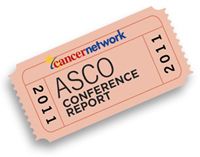ASCO Breast Cancer Symposium Intro Page
CancerNetwork presents exclusive coverage from the American Society of Clinical Oncology's (ASCO) 2011 Breast Cancer Symposium. Follow the stories below and check back for more write-ups of the most important information to come out of this year's event.

CancerNetwork presents exclusive coverage from the American Society of Clinical Oncology's (ASCO) 2011 Breast Cancer Symposium. Follow the stories below and check back for more write-ups of the most important information to come out of this year's event.
Check back here for breast cancer news and updates from our coverage of the meeting in San Francisco.
CancerNetwork speaks with Dr. Joseph Sparano, Professor of Medicine and Women’s Health at the Albert Einstein School of Medicine and Associate Chairman of the Department of Oncology at Montefiore Medical Center in New York, about the session he will chair at the ASCO Breast Symposium on September 8-10, in San Francisco.

Joseph Sparano, MD
CANCERNETWORK: We’d like to start by asking if you’d give a brief overview of what you hope to cover at the ASCO Breast Symposium.
SPARANO: I will review some of the mulit-paramater, or gene expressions assays that are currently available and approved for use in clinical decision-making in breast cancer. The two that are the most widely used both inside and outside the United States are the Oncotype DX assay and the MammaPrint assay-both of these are most widely used for women that have ER positive, HER-2 negative breast cancer associated with negative axillary lymph nodes, and are used to help make decisions about potential benefits associated with recommending adjuvant chemotherapy. . .
Targeted Therapy First Strategy Reduces Need for Chemotherapy in Newly Diagnosed LBCL
December 7th 2025Lenalidomide, tafasitamab, rituximab, and acalabrutinib alone may allow 57% of patients with newly diagnosed LBCL to receive less than the standard number of chemotherapy cycles without compromising curative potential.